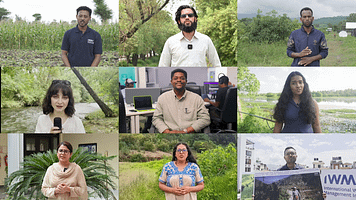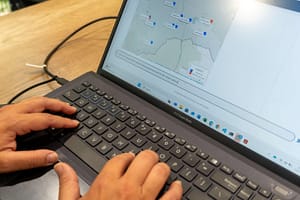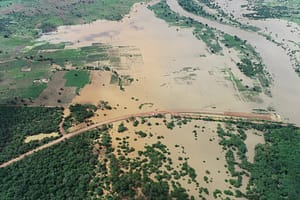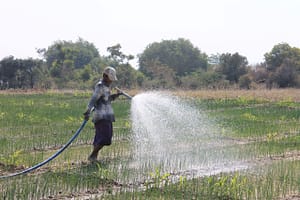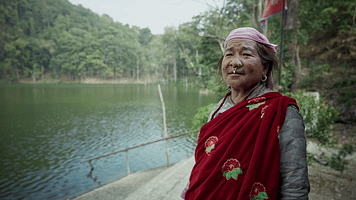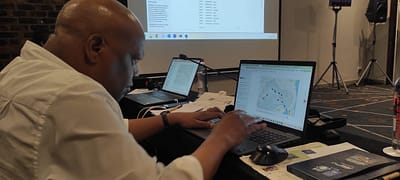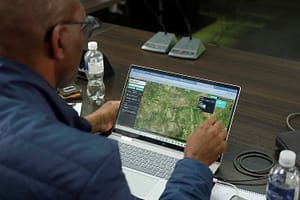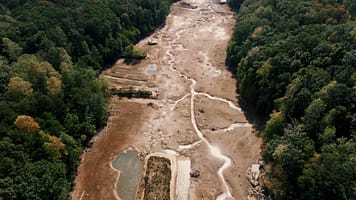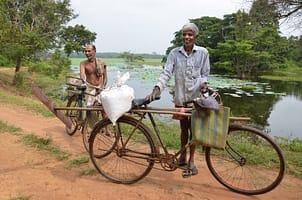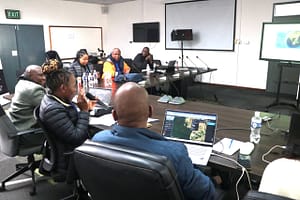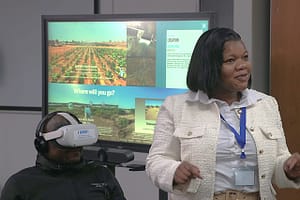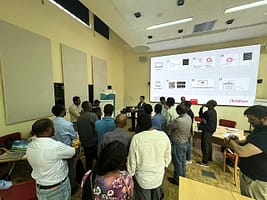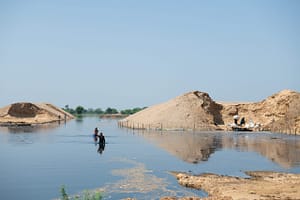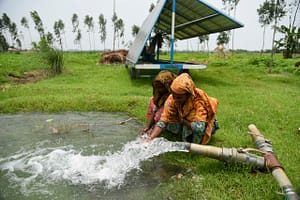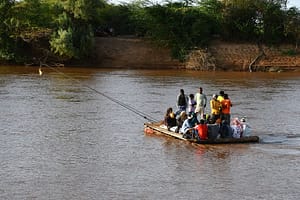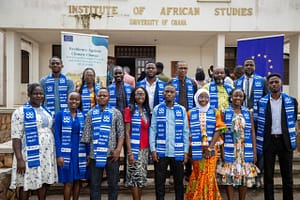Nepal examines strategies to transform its agrifood system
Government partners and researchers in Nepal explore the integral role of irrigation, innovation and institutions in achieving sustainable agrifood system
A community in Wadi Seer inspires action for Jordan’s climate resilience
As springs flow again in Wadi Seer, a community shows how Jordan can scale nature-based solutions for water security and
Open access model and data on blue and green water consumption of crops to help close water data gap
IWMI researchers report a 9% increase in global crop water consumption between 2010-2020, adding further pressure on already strained water
Science helps make humanitarian efforts in Sudan more targeted and sustainable
In Sudan, IWMI and partners are bringing science, data and tools to humanitarian settings so that local actors can manage
IWMI appoints Kehinde Ogunjobi as Country Representative for Ghana covering West and Central Africa
The new role of the IWMI Country Representative in Ghana will lead strategic research-for-development and policy engagements across the West
IWMI’s work under the Al Murunah project advances resilient nature-based water solutions across MENA
Experts from Egypt, Jordan, Lebanon and the Occupied Palestinian Territory gathered in Egypt to strategize on scaling resilient nature-based water
Community voices hold the key to solving Pakistan’s water governance puzzle
Through education and citizen science, IWMI supports communities in Kyber Pakhtunkhwa to connect with water policy and restore trust in
July-August 2025 Research Journal Roundup
Roundup of research, journal and other academic articles from July and August 2025.
Science-policy dialogue in the eastern Nile Basin to enhance synergies across the water, food, energy and ecosystems
In the eastern Nile Basin, researchers and policymakers are coming together to put solutions into practice at the intersection of
Addis Ababa tackles rising flood risk
For Addis Ababa’s 3.5 million residents, floods regularly endanger livelihoods. IWMI and city officials have co-developed a dashboard to mitigate
IWMI launches platform to boost farmer-led irrigation in Nigeria
The platform will serve as a hub for research, innovation and policy engagement to unlock irrigation development and strengthen resilience
Tech offers lifeline to Okara farmers
UK-supported technologies introduced in Okara, Pakistan, are giving farmers new tools to save costs, improve productivity and strengthen the country's
India to push for inclusive solar irrigation pumps
IWMI and partners convened a capacity-building workshop in Lucknow to support the adoption of solar irrigation pumps under India’s PM-KUSUM
Managing nature, naturally, across the Water-Energy-Food-Ecosystem nexus to build resilience
Nature thrives on connection. Rivers feed forests, forests shape the climate and healthy ecosystems sustain communities. When managed in isolation,
Cybersecurity risks are rising for water utilities — here’s why
Hackers are turning water into a new target. For the Global South, the stakes are high — but simple, practical
Digital innovation and citizen science to preserve freshwater systems
A new IWMI project aims to create a transboundary citizen science network across southern Africa, using digital tools to collect
Sustainable fish farming in Myanmar gets a smart boost
Deployed across 170 townships, IWMI’s Aqua Decision Support Tool guides policymakers and farmers towards climate-resilient, profitable aquaculture in Myanmar.
A network of citizen scientists to protect freshwater resources in southern Africa
A new IWMI initiative combines innovation with community participation to plug water data gaps.
Cape Town to host global conference on gender
IWMI is co-hosting the CGIAR 2025 Gender Conference which will focus on solutions and strategies to advance gender equality in
Science and policy work together to advance food security in Lao PDR
Lao PDR’s national Policy Think Tank partners with IWMI to strengthen officers’ research skills, empowering them to design agricultural policies
IWMI holds its first annual scientific meeting on water security and innovation for Egypt
The inaugural meeting, held in June 2025, focused on advancing water security and innovation with experts, policymakers and researchers sharing
Young people are reimagining irrigation with innovation, inclusion and equality at its core
At the 4th World Irrigation Forum, Mark Smith, director general of IWMI, reflected that making irrigation truly “future-fit” requires listening
IWMI and Microsoft use AI to tackle southern Africa’s water challenges
As we combine IWMI’s research capabilities with Microsoft’s cutting-edge AI technology, we tackle pressing water management challenges in southern Africa’s
IWMI’s “Murunah” Project in Wadi Al-Seer advances environmental and community-based solutions in Jordan
Jordan's Minister of Environment visits IWMI's project in Wadi Al-Seer, calling it a successful model for water security and climate
AI agent by IWMI and Microsoft to drive new thinking in water management
The collaboration combines IWMI’s research capabilities with Microsoft’s cutting-edge AI technology to tackle pressing water management challenges in southern Africa’s
Water lies at the centre of Africa’s climate adaptation
IWMI's Meron Teferi Taye highlights how Africa can reduce its vulnerability to climate change impacts by improving how water is
Can risk mapping safeguard livelihoods in Ghana’s flood-prone White Volta Basin?
Flood modeling combined with earth observation data is strengthening climate-smart land-use planning and disaster risk reduction in northern Ghana.
IWMI appoints Johan Gely as Asia Director for Research Impact
The new role will oversee research-for-development capabilities across Asia.
Harnessing water to drive Africa’s agrifood transformation
IWMI continues to support the CAADP, Africa’s foremost policy framework on agriculture through the program’s new 2026-2035 strategy.
New Agri-Energy Coalition launched to tackle food and energy gaps
IWMI is among the leading organisations forming the new multi-stakeholder alliance — the Agri-Energy Coalition — to address critical challenges
A systems approach to resolving the paradox of irrigation efficiency
Can the Irrigation Savings Allocation Framework sustainably shift water use from irrigation to ecosystems and cities more effectively?
The WEFE Nexus: A new path for local resource governance in Nepal
In Nepal’s Rangun watershed, the International Water Management Institute (IWMI) is applying the Water Energy Food Ecosystem (WEFE) Nexus to
IWMI and DE Africa help Limpopo water managers monitor dam levels with AI and satellite data
Across Africa, farmers rely on water from dams to irrigate their crops through periods of drought. But how much water
AI and satellite imagery better estimate water levels in dams
IWMI and Digital Earth Africa are supporting water managers from Limpopo River Basin by improving access to better data and
Drought Action Catalyst to co-develop localized drought management approaches
The Drought Action Catalyst is a one-stop shop where decision-makers and experts working on building drought resilience in their countries
IWMI and IUCN explore solutions to Sri Lanka’s environmental challenges
Joint symposium brings together science, policy and community action to protect Sri Lanka's most at-risk biodiversity and water systems.
Africa’s water challenge and the solar-powered solution
In this World Water Week 2025 episode of PIDG Pulse, IWMI’s Petra Schmitter joins experts to explore solutions for Africa’s
A global debate on the hydrological cycle as a global common good
At World Water Week 2025, participants will explore the impact of the Global Commission on the Economics of Water report
IWMI introduces cutting-edge AI citizen-science tools to the Limpopo River Basin
Water managers in southern Africa get hands on with the AI-powered Digital Twin.
Water managers get hands on with the AI-powered Digital Twin for the Limpopo river basin
Water managers from Southern Africa share their impressions of the Digital Twin developed by IWMI along with the Limpopo Watercourse
IWMI taps into local knowledge to build climate resilience in Jordan’s Jerash Camp
On this World Humanitarian Day, we shed light on how IWMI’s climate-risk mapping is helping Jordan’s most crowded refugee camp
Technology and partnerships to strengthen flood resilience in Ethiopia’s fragile environment
IWMI and partners are co-developing a digital twin platform to enhance flood forecasting, early warning and response for vulnerable communities
Hydraulic Ram Pump irrigation system brings ease in Mansehra
How eco-friendly technology is reshaping lives in Pakistan's Mansehra District.
South Africa Summit to make water an investment priority
An African summit to improve access to water was held in Cape Town, South Africa, attended by several leaders from
Can Pakistan turn recurring monsoon chaos into long-term water security?
As Pakistan braces for another intense monsoon, the crisis presents both a stark warning and a rare opportunity — underscoring
Explainer: Groundwater
Groundwater is essential for human health, food production and ecosystems. With proper management, it provides a reliable and resilient source
The Frontlines Learning Exchange webinar series sheds light on science in difficult places
FLEX shares critical knowledge on climate resilience from conflict-affected settings and offers a space for learning, collaboration and collective action
Shaping climate action in Ghana: the legacy of the Resilience Against Climate Change project
As the EU-funded Resilience Against Climate Change – Social Transformation Research and Policy Advocacy (REACH-STR) project comes to a close
Communities lead the sustainable management of the Nong Lom wetlands in Lao PDR
IWMI works with members of communities in the Nong Lom wetlands, empowering them to lead the protection, management and development
A blueprint for scalable water and waste solutions emerges in Ethiopia
Ethiopia is laying the groundwork for circular bioeconomy and paving the way for sustainable development.























